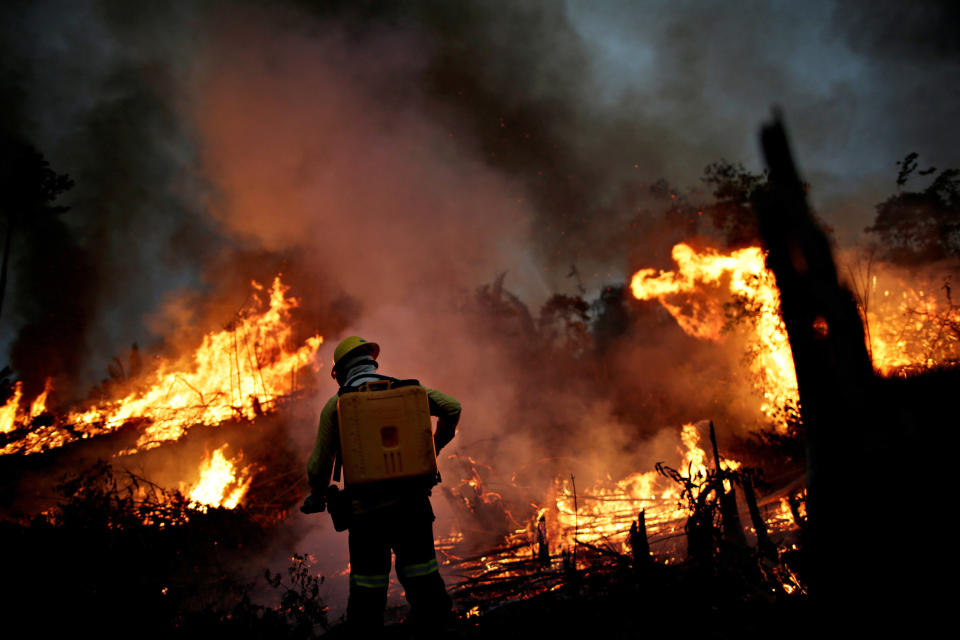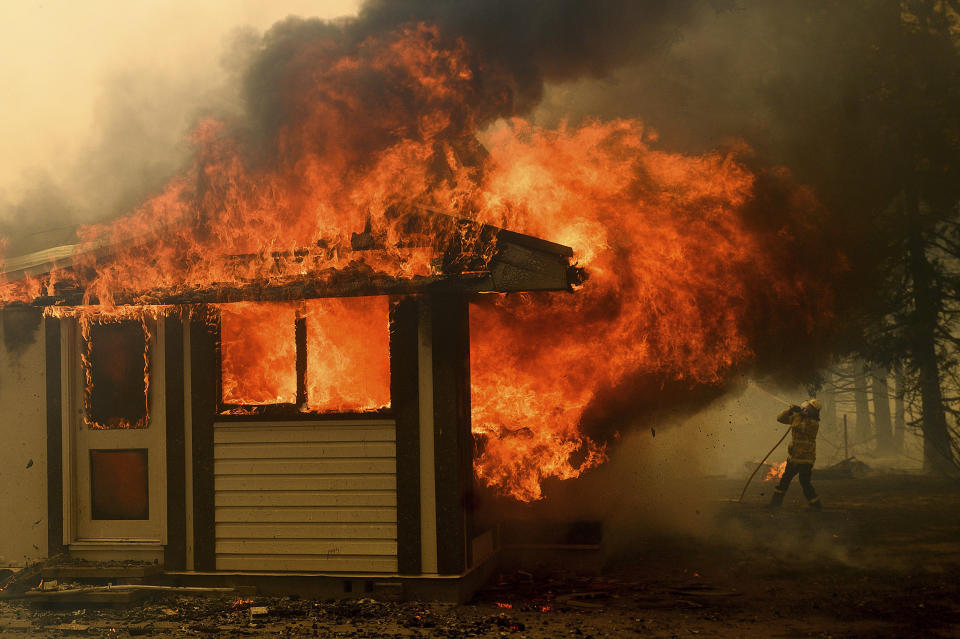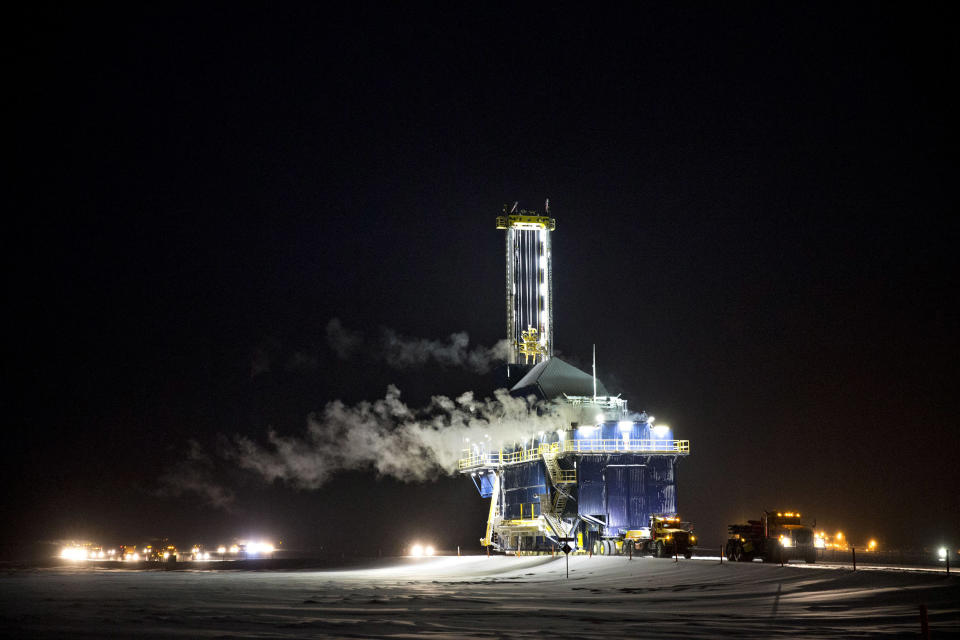World leaders pledged to protect nature. The U.S. and two others refused to commit.
LONDON — A million species of plants and animals including Asian elephants, orangutans and blue whales are now at risk of extinction, according to the United Nations.
Last month, 70 world leaders signed the “Leaders Pledge for Nature” and vowed to take steps to halt the catastrophic human-made decline.
There were three notable exceptions among those who didn’t sign — President Donald Trump, his Brazilian counterpart Jair Bolsonaro and Australian Prime Minister Scott Morrison.
Their rejection wasn’t a complete surprise. All have historically been reluctant to commit to stronger action on the environment — and actually, in the cases of Trump and Bolsonaro, reversed the progress.

Their stances are increasingly pitting them against much of the world, which says it will try and tackle the crises of climate change and the mass extinction of the planet’s biodiversity — the entire living world from the insects that pollinate our crops to the largest whales in our seas and the trees in our forests.
Many leaders are now projecting “a completely different message,” because there is wider acknowledgement that destruction of the natural world makes further devastating pandemics more likely, Elizabeth Mrema, executive secretary of the U.N. Convention on Biological Diversity, said.
There is also a growing awareness that our food systems and economic prosperity rely on nature and a realization that this really is “our last chance” to act, she added.
“These myriad interactions of life underpin fundamental processes that our food production systems rely on, that stabilize our climate, that makes the planet livable,” Julia Jones, a professor at Bangor University in Wales, in the United Kingdom, said, “if the general public realized just how bad it was, it would shock them.”
The U.S., Brazil and Australia account for a large percentage of the planet’s land surface area and particularly in the case of Brazil, home to some of its most important biodiversity.
Although the Amazon is home to 10 percent of the known species, deforestation — primarily for farming beef — has increased under Bolsonaro with 2020 setting new records for burning.

Global wildlife population decline is most severe in the tropics of Latin America — including the Amazon — where it is down on average by 94 percent in just 50 years, according to a recent World Wildlife Fund report.
Trump, meanwhile, has overseen a weakening of environmental standards, approved oil and gas leasing in an Alaskan wildlife reserve, and reviewed the status of federally protected lands. He’s also in the process of withdrawing the U.S. — one of the few countries not party to the U.N. Convention on Biological Diversity — from the Paris Agreement.
Australia is the world’s largest exporter of coal, which releases large amounts of carbon dioxide, a greenhouse gas, into the air when burned. These gases trap heat in our atmosphere, causing global warming.
Download the NBC News app for breaking news and politics
Morrison leads a government that supports the mining industry, despite his country suffering a devastating wildfire season this year, which killed billions of animals.
Scientists blamed climate change for the severity of the fires, but Morrison tried to minimize the role it played.
Australia has agreed to emissions reduction targets under the Paris Agreement but the country's action so far has been criticized and it sits sixth from bottom on the 2020 Climate Change Performance Index — which ranks 61 countries responsible for 90 percent of emissions on their climate change action.
When pressed on why Australia didn't sign the biodiversity pledge, Morrison's spokesperson said the country would not “agree to other targets unless we can tell the Australian people what they will cost to achieve, and how we will achieve it.”

The U.S. and the Brazilian governments did not respond to requests for comment.
The absence of the U.S., Brazil and Australia is concerning scientists, said Anne Larigauderie, executive secretary of the Intergovernmental Science-Policy Platform on Biodiversity and Ecosystem Services — an independent body that provides policymakers with scientific assessments about the state of nature.
In just a few decades, the world has seen “a complete deterioration of nature at a rate and scale unprecedented in human history,” she said in a telephone interview from Bonn, Germany.
The urgency of the crisis was underlined at last month’s U.N. summit which attempted to build momentum toward a new global agreement on nature and saw the leaders of over 70 countries — including the European Union, Britain, Canada and New Zealand — pledge to take action.
Trump did not take part, while Bolsonaro slammed what he called “international greed” over the Amazon in a speech to the U.N. biodiversity summit on Sept. 30.
The summit was the precursor to a gathering of world leaders at the United Nations Biodiversity Conference, known as COP15, that was due to take place in Kunming, China, from Oct. 15 to 28, but postponed until May due to the coronavirus pandemic.
World leaders last agreed to a decade of action on biodiversity in 2010 in Nagoya, Japan, at COP10, yet “not a single one of the 20 biodiversity targets for 2020 have been reached,” Larigauderie said.

China — which, as host of COP15, will be under pressure to push for action — did not sign the most recent pledge either without giving a reason. But President Xi Jinping used his speech at the Sept. 30 summit to distance himself from countries refusing to join global efforts.
“Unilateralism finds no support, cooperation is the right way forward,” he said. “We must firmly safeguard the U.N.-centred international system and uphold the sanctity and authority of international rules so as to enhance global governance on the environment.”
Xi could be holding back major pledges until COP15 where they will have a bigger impact politically, said Richard Black, director of the Energy and Climate Intelligence Unit, an environmental think tank based in London.
Whether the necessary steps will be taken will all come down to “political will,” Larigauderie said.
“Biodiversity issues are not national issues, they are cross border,” Mrema added. “And that’s why we really underline the issue of multilateralism, international cooperation and global solidarity.”

